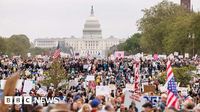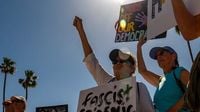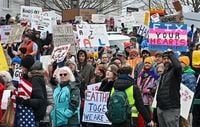On Saturday, April 5, 2025, cities across the United States erupted in protests aimed at denouncing President Donald Trump and his administration's policies. Dubbed the "Hands Off" protests, organizers planned rallies in over 1,200 locations nationwide, including all 50 states. The demonstrations represented one of the largest coordinated efforts against the Trump administration since he took office in January.
From Boston to Los Angeles, thousands gathered to voice their grievances, which ranged from immigration policies to economic issues. In Boston, the protests were spurred by recent immigration raids that targeted university students, leading to arrests and deportation proceedings. Law student Katie Smith, who participated in the Boston rally, cited the arrest of Turkish international student Rumeysa Ozturk near Tufts University as a motivating factor. "You can stand up today or you can be taken later," she explained, emphasizing her newfound commitment to activism.
In Washington D.C., a significant crowd gathered to hear speeches from Democratic lawmakers who criticized the influence of wealthy donors, particularly Elon Musk, on the Trump administration. Florida Congressman Maxwell Frost passionately denounced what he termed the "billionaire takeover of our government," stating, "When you steal from the people, expect the people to rise up. At the ballot box and in the streets." The protests unfolded just days after Trump announced a controversial plan to impose tariffs on imports from numerous countries, further fueling public discontent.
As protests unfolded across the nation, international cities like London, Paris, and Berlin also saw demonstrators rallying against Trump’s policies. In London, protesters held signs reading, "WTAF America?" and chanted phrases like "hands off Canada" and "hands off Ukraine," referencing Trump's contentious foreign policy positions. His interest in annexing territories like Greenland and his public disputes with leaders such as Ukraine's President Volodymyr Zelensky have drawn ire from many.
The protests in Palm Springs, California, were particularly notable, with an estimated 2,000 people gathering at city hall. Attendees included local officials like U.S. Representative Raul Ruiz and Palm Springs City Councilmember Grace Garner, who spoke out against the administration's policies. Joy Silver, a founder of the activist group Courageous Resistance-Indivisible of the Desert, emphasized the importance of community action, stating, "We have to stand up for our rights. This is a movement for everyone who feels left behind by this administration."
In Maine, thousands also took to the streets, with the Portland protest alone shutting down Congress Street. Attendees expressed concerns over cuts to essential programs like Social Security and Medicare, as well as broader issues related to the federal workforce. Andy Wright, a 65-year-old protester from Falmouth, held a sign that read, "Hands off Social Security, Medicaid, Medicare," reflecting the anxiety many feel about their future under current policies.
Polling data has indicated a decline in Trump's approval ratings, with a recent Reuters/Ipsos poll showing a drop to 43%, the lowest since the beginning of his second term. This decline has been mirrored by growing public dissatisfaction with his handling of economic issues. According to the same poll, only 37% of Americans approved of his economic management, while just 30% supported his strategy to combat rising living costs.
In the wake of these protests, Trump's administration defended its policies. A White House statement reiterated Trump's commitment to protecting programs like Medicare and Social Security, while accusing Democrats of attempting to undermine these benefits. Tom Homan, one of Trump's immigration advisors, dismissed the protests, stating, "They can protest a vacant house all they want," suggesting that the demonstrations would not change the administration's course.
Despite the administration's dismissal, the protests reflect a growing wave of political activism across the country. Many participants emphasized the importance of collective action in addressing grievances. In Portland, Lisa Miller, another protester, articulated the need for a groundswell of public support to reverse the current political trajectory: "The only way we’re going to reverse the course we’re on is to have a groundswell of everyday people."
The protests also highlighted a broader discontent with the administration's approach to governance, particularly its focus on reducing the federal workforce and cutting funding for essential services. The grassroots nature of these protests underscores a significant shift in public sentiment, as individuals who may have never before engaged in political activism are now compelled to speak out.
As the protests concluded, many participants expressed a desire to continue their activism, urging others to reach out to their representatives and remain vigilant. Barbara Dee, an organizer of the South Portland rally, encouraged attendees to maintain momentum, stating, "This is a huge fault on the foundations of America." With the political landscape in flux, the "Hands Off" protests may signify a turning point for many Americans who feel their voices are finally being heard.






